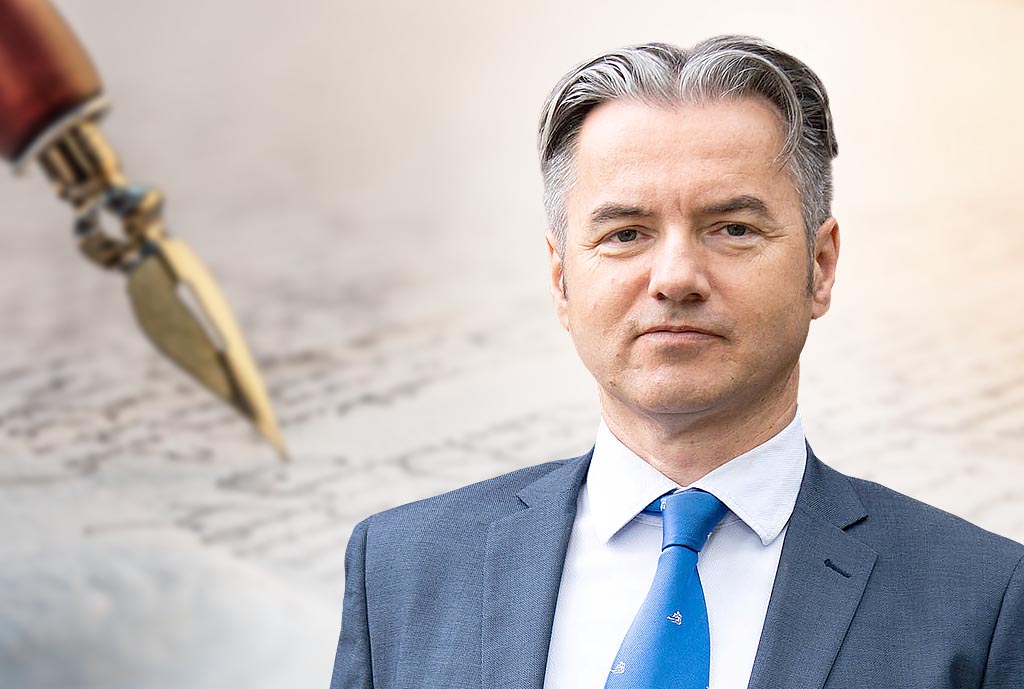By: Dr Metod Berlec
This year’s Statehood Day found itself partially overshadowed by the attempted military coup in Russia over the past weekend. We celebrated under a government that was helped into power by a backstage godfather who never considered Slovenian independence “the most intimate option”.
However, it is important to emphasise that we witnessed an unusual state celebration this year, where more attention was given to climate change rather than the independence of the Republic of Slovenia. The speech by the President of the Republic, Nataša Pirc Musar, somewhat resembled the speeches of former President Danilo Türk, who called for a “break with the junk of the transitional period” and “taking credit for independence”. In this regard, the case of the infamous Mayor of Ljubljana, Zoran Janković, demonstrated that there is still plenty of this “transitional junk”. As we wrote in the latest edition of Demokracija magazine, Janković was acquitted last week in the Ljubljana District Court. Like dominoes, the legal proceedings against Janković are falling one after another. In the beginning of May, even the Minister of Justice, Dominka Švarc Pipan, embraced him at a partisan celebration (in Orle), and last Saturday, the President of the Supreme Court of the Republic of Slovenia, Miodrag Đorđević, greeted him on the VIP stand at the Stožice stadium (before the football match between Slovenia and Denmark). This means that both the executive (let’s also remember the public apology of Minister of Health, Danijel Bešič Loredan) and the judiciary are bowing to a person who is suspected of numerous criminal acts and wrongdoings, and they hand in hand enable him to remain untouched, because, as he himself said years ago, he is “an opponent of Janez Janša”. On the other hand, it is interesting to note that a person of questionable reputation, responsible for the security of Prime Minister Robert Golob, has been convicted with legal force.
But let’s return to the largest country in the world. As mentioned in the foreword of the book “Forum São Paulo and the Cultural War”, the President of the Slovenian Democratic Party, Janez Janša, warned that the Russian Federation today actually fits the description from Resolution 1096 of the Parliamentary Assembly of the Council of Europe, which timely warned about what would happen in those post-communist countries that fail to dismantle the legacy of former communist regimes: “In the best-case scenario, oligarchy can prevail over democracy, corruption over the rule of law, and organised crime over human rights. In the worst-case version, there may be a velvet restoration of the totalitarian regime or even violent overthrow of the emerging democracy.” All of this was further confirmed by the Russian military aggression against Ukraine, which revealed the weaknesses of the Russian army (and society) undermined by corruption, crime, and clientelism. In this regard, it is worth summarising the conclusions of the former Russian businessman (tycoon) and opposition activist living in London, Mikhail Khodorkovsky. According to him, the attempted military coup by PMC Wagner leader Yevgeny Prigozhin was one of the most serious political events in Russia in the last 20 years. For the second time since Putin took power, Russia faced a revolutionary situation. The first was the mass protest against the election results in 2011/2012. Similar to that time, the democratic opposition this time also failed to capitalise on the situation because they were preparing for different scenarios. “The democratic movement must learn a lesson: regime change will not come from the ballot box… Prigozhin’s uprising showed the West a plausible scenario for regime change in Russia and the political forces that could take over the Kremlin.” According to Khodorkovsky, the uprising was positive and signalled the end of Putin’s rule. “But Prigozhin is just as, if not more, a robber than Putin. If the West wants a new robber responsible for nuclear Russia, it must rely on the Russian democratic anti-war opposition and support them.”
Thus, one of Putin’s most prominent opponents called on the West to support associations such as the Russian Action Committee, which includes numerous prominent Russian opposition figures, to compete with militarised Russian nationalists. “The West must decide who it will join for the future of Russia. After Prigozhin’s uprising, aligning with Putin and his team is meaningless. The most important result of these events was that Putin was seriously weakened, lost legitimacy, and became a lame duck.” It became apparent that Putin does not control the state or the soldiers, and the population does not believe his myths about the war. To end the uprising, he had to seek help from Lukashenko and Kadyrov, and the people in the occupied cities welcomed Wagner’s fighters. Prigozhin’s campaign did not end with him taking power, but it took away a considerable portion of Putin’s power and brought about the beginning of the end of his rule. Obviously, Prigozhin decided to revolt knowing that he could lose his private army, and consequently, his political influence and even his life, because he is aware of the state of Putin’s war machine and the morale of his soldiers. This knowledge led him to consider that his uprising has a serious chance of success. That is the main conclusion of his campaign in Moscow. “Now the country and the world know that it is possible to resist Putin without him being removed, because Putin is weak…”
In short, Russia is entering a period of uncertainty and interregnum, similar to 1917 after the February Revolution, which marked the end of Tsarist Russia, or like August 1991 after the failed coup attempt, which ultimately led to the collapse of the Soviet Union later that year.

